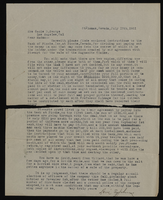Search the Special Collections and Archives Portal
Search Results
Ann Valder Papers
Identifier
Abstract
Ann Valder Papers (1963-1984) include agendas and minutes, programs, invitations, events, and newspaper clippings. The papers are limited to the time Valder spent working for the Review Journal and the Valley Times in Las Vegas, Nevada. The activities covered are her work with Southern Nevada Memorial Hospital and the American Cancer Society.
Archival Collection
Maria Burston Wheeler Papers
Identifier
Abstract
The Maria Burston Wheeler Papers date from approximately the 1850s to 1933 and record Maria Walker's childhood and voyage from Liverpool, England to Salt Lake City, Utah in the United States through her manuscript "My History." The manuscript details her and her family's trans-Atlantic journey as well as her own journey as a married woman, Maria Burston Wheeler, to Las Vegas, Nevada to establish the Mormon Fort located there. Her manuscript details daily life at the fort.
Archival Collection

Film transparency of the ruins of the H. D. and L. D. Porter Brothers Store, Rhyolite, Nevada, November 25, 1948
Date
Archival Collection
Description
Image

Correspondence, Levi Syphus to Sadie George
Date
Archival Collection
Description
Text

Transcript of interview with Jackie Abell by Robert Stuart, April 03, 1976
Date
Archival Collection
Description
Text

Transcript of interview with George Burns by Sandy Fink, April 03, 1976
Date
Archival Collection
Description
Text
Denny Lynch Photograph Collection
Identifier
Abstract
The Denny Lynch Photograph Collection (approximately 1900-1990) contains photographic prints and negatives of the Lynch family and their homes in Pahrump Valley and near Blue Diamond, Nevada. The photographs also depict locations and people throughout Nevada, primarily in Pahrump and Amargosa with a focus between approximately 1970 and 1990. Other photographs include local, state, and federal politicians in Nevada and Washington, D.C. Most of these photographs were collected by Denny Lynch for his newspaper, the Pahrump Tribune.
Archival Collection

Biographical essay by Celia Strauss, 2014
Date
Archival Collection
Description
Celia Strauss describes her family history in Poland and fleeing the Nazis, narrowly escaping being captured or shot several times. She and her family came to the United States in 1947.
Text


